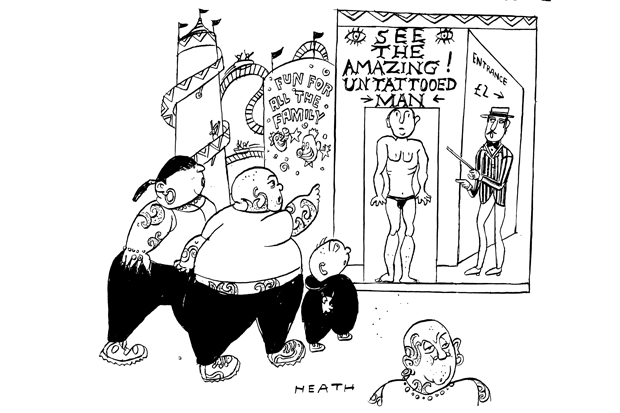Books do furnish a room, and quirky books for Christmas do furnish an enormous warehouse somewhere within easy reach of the M25. There are more of them than ever this year, some purportedly comic, some wilfully trivial, a few of them uncategorisable in their oddness, but all of them have one thing in common: they will be outsold by the Hairy Bikers’ diet book. Anyone who tells you that the world is a just and fair place has never written a quirky book for Christmas.
In the still popular trivia category — which has survived the stark retraction of the Ben Schott empire — two books stand out. The Unbelievable Truth (Preface, £16.99, Spectator Bookshop, £13.99) is a spin-off from the Radio 4 panel show, where hard-to-believe facts vie with easy-to-believe lies. The book, however, concentrates on the facts, and they are a splendid crop.
Look up L for Lemons, and we have the following. Rubbing a lemon under your arms is a traditional Puerto Rican treatment for a hangover. Casanova gave his mistresses partially squeezed lemon halves to use as contraceptives. And at the Battle of Lepanto in 1571, when the outnumbered Ottoman fleet ran out of missiles, they threw lemons and oranges at the Holy League soldiers, who in turn threw them back. Graeme Garden, he of The Goodies, and Jon Naismith compile the show and wrote the book, but needless to say the only person mentioned or shown on the cover is the show’s host David Mitchell, whose only contribution here is a brief introduction. Ah, the power of celebrity.
No less inventive is Numberland: The World In Numbers (O’Mara, £12.99, Spectator Bookshop, £10.99) by Mitchell Symons, the doyen of all things trivial. In this, his 459,253rd book, Symons throws together an extraordinary proliferation of daft numerical facts, and in so doing has created the lavatory book of the year. Here are three from the sport section. Maria Sharapova’s loudest grunt was measured at 101.2 decibels in Wimbledon in 2005: that’s louder than a motorcycle or a lawnmower. The oldest golfer to ‘score his age’ was C. Arthur Thompson, who in 1973 hit a 103 at the age of 103. And the number of golf balls lost in water hazards on British golf courses every year? Just 20 million or so.
And how many new books are there about words, grammar and language? By the time you got round to counting them all, another dozen or so would have come out. Nonetheless, Harry Ritchie’s English for the Natives: Discover the Grammar You Don’t Know You Know (John Murray, £14.99, Spectator Bookshop, £11.99) leaps to the top of the pile for its sharp, good sense, linguistic rigour, sense of humour and absolute rejection of 19th-century pedants who won’t let you start a sentence with ‘and’ or split an infinitive.
Funnier still, and infinitely more depressing, is Steven Poole’s Who Touched Base In My Thought Shower? (Sceptre, £9.99, Spectator Bookshop, £8.49), a brutal demolition of modern office jargon. Change management, brown-bag session (a meeting into which people take packed lunches), blue-sky thinking, actionables and deliverables: they are all here. Expanded from an article he wrote in the Guardian in April, Poole’s book does show occasional signs of having been written in a rush, but it’s a valuable glossary to corporate life and demonstrates the empty-headed arrogance of what passes for management style. Supervising not an important job enough for you? Then try hypervising instead. Really, some of these people are lucky not to be murdered at their desks.
This year’s uncategorisable is Dedicated to… (Bantam Press, £9.99, Spectator Bookshop, £8.49) compiled by W.B. Gooderham, who I am assuming has gone for initials because he is called Wayne. (Are there certain Christian names that make it harder to get books published? Discuss.) This is, simply and gloriously, a collection of personal inscriptions Gooderham has found in second-hand books. Some are intimate, some are gnomic, one or two are bitter and scabrous, all are deeply personal, and each one is in a book that has eventually found its way into a second-hand bookshop. So whatever they wrote, it didn’t mean enough to the recipient for them to keep the book. This is an idea so slight it shouldn’t work, and yet you can’t stop reading these inscriptions, and imagining the stories behind them, and desperately hoping that one of your own won’t turn up on the next page.
Most humorous books submitted this year failed in their core activity (cf. Poole) of making you laugh. Book fetishists will delight in an elegant new hardback edition of Stephen Potter’s Gamesmanship (Elliott and Thompson, £9.99, Spectator Bookshop, £8.99), which reads as beautifully as it always did. Otherwise, though, all titles are blown out of the water by Private Eye: A Cartoon History, edited by Nick Newman (Private Eye, £25, Spectator Bookshop, £21.25). In the interest of fair play I should reveal here that I have a connection with the Eye, and fully expect therefore to be denounced and lampooned in several log-rolling columns. But sod it: this is a masterly piece of work, to be cherished by anyone who values cartoons and the furious, drunken men and women who draw them. Moreover, unlike the Punch anthology that appeared a couple of years ago, it’s funny from beginning to end. The more beautifully drawn cartoons, such as those by McLachlan and Honeysett, are given the space they deserve (in the magazine you often need an electron microscope to see them). Even cartoonists should like it, when they have finished counting how many entries they have in the book, and then getting cross because Michael Heath has more.
Got something to add? Join the discussion and comment below.
Get 10 issues for just $10
Subscribe to The Spectator Australia today for the next 10 magazine issues, plus full online access, for just $10.
You might disagree with half of it, but you’ll enjoy reading all of it. Try your first month for free, then just $2 a week for the remainder of your first year.














Comments
Don't miss out
Join the conversation with other Spectator Australia readers. Subscribe to leave a comment.
SUBSCRIBEAlready a subscriber? Log in